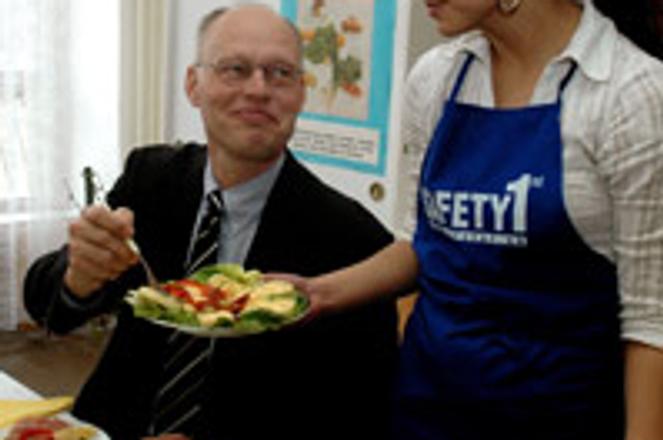IN AN effort to fight stereotypes about the working habits of the Roma, U. S. Steel Košice has launched a special employment project to help those who are willing to work. U. S. Steel now employs more than 150 Roma on contract in various parts of the company. In mainstream Slovak society, there is a pervasive stereotype that Roma people do not want to work and that they tend to commit criminal offences, said the spokesman of U. S. Steel Košice, Ján Bača.
"This bad reputation is the biggest problem for those who really want to work and are able to work, but cannot get
a chance," Bača said.
The company saw an opportunity to help them. The idea to launch the special employment project arose after the former president of USSK, John H. Goodish, met with the mayor of the village of Veľká Ida, František Šnír, in 2002. Veľká Ida is close to the U. S. Steel plant, and it has a large Roma community, which had a 100-percent unemployment rate at the time.
Helping the Roma and other people from disadvantaged groups find jobs can have some hidden obstacles, Bača said.
"You could offer them jobs that are unsuitable for them, or choose Roma who are not suitable for the jobs," he said. They might not have the knowledge to do the jobs, or they might not want to do it at all.
"One of the reasons this project is successful was because the Roma selected for the jobs we offered were picked by people who know them personally," Bača said.
It helps to have people from the community involved in the project, because they know the workers and their families, he said. For example, the mayor of Veľká Ida chose people from that community for the jobs we had available, and we closely cooperated with a local priest at Lunik IX.
Workers are selected after USSK offers a package of jobs to be done. The mayor or another person from the community picks potential workers, and they are hired on contract through personnel leasing.
"In the future, we plan to provide training in a variety of skills to people who demonstrate the potential to learn and grow. We will work with the apprentice school to identify the most capable people," said Bača.
Before we started, the company had to define what kind of work would be suitable for people who lack qualifications, but have the potential for growth.
"For example, some of the people we hired for other jobs now work as operators," said Bača. "Others are now getting training."
To motivate other people taking part in the project, the most successful Roma workers are offered a regular employment contract.
"But we mainly want to have a positive example to show the others, so that the best will draw the others upwards and not vice-versa," said Bača. "These people are working hard, and to work for USSK often means getting up at 5 a.m. and working shifts."
Since 2002, when the project started with 15 Roma from Veľká Ida, the Košice district of Šaca and the Lunik IX housing estate have joined as well. There are now 156 successful workers, including 80 from Veľká Ida. That means 80 families in the local Roma community have a regular income. USSK will continue this project in 2008, said USSK President David Lohr. The company wants to expand the programme with more educational activities.
"We think that training courses will help us pick the best participants in the programme, and thus find more potential employees for USSK, and for other companies that show an interest in the programme," he said.
Howe Leather, a company located in Košice, has already expressed an interest, USSK says and they have been approached by other companies associated with AmCham.


 (source: Courtesy of U. S. Steel)
(source: Courtesy of U. S. Steel)